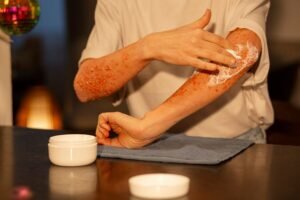Atopic Dermatitis Treatment in Punjab

book your appointment

Understanding Atopic Dermatitis
Atopic dermatitis, commonly known as eczema, is a chronic inflammatory skin condition that affects millions of people worldwide. Atopic dermatitis treatment in Punjab is essential due to the condition’s prevalence. It is characterized by red, itchy, and sometimes swollen patches of skin. Atopic dermatitis is most common in children but can occur at any age. Dr Parwaaz Matharoo, a leading dermatologist in Punjab, offers comprehensive treatment options for managing and alleviating the symptoms of atopic dermatitis at The House of Skin.

Symptoms and Diagnosis
Symptoms
Atopic dermatitis manifests in various ways, and its symptoms can differ from person to person. Common symptoms include:
- Intense Itching: The hallmark of atopic dermatitis, itching can be severe, especially at night, leading to discomfort and sleep disturbances.
- Red or Brownish-Gray Patches: These patches typically appear on the hands, feet, ankles, wrists, neck, upper chest, eyelids, and inside the bends of the elbows and knees. In infants, the face and scalp may also be affected.
- Small, Raised Bumps: These bumps can leak fluid and crust over when scratched, leading to further irritation and potential infection.
- Thickened, Cracked Skin: Chronic scratching can cause the skin to become thickened, leathery, and cracked, a condition known as lichenification.
- Raw, Sensitive Skin: Excessive scratching can result in raw, sore skin that is highly sensitive to touch and prone to infections.
Diagnosis
Diagnosing atopic dermatitis involves a comprehensive evaluation process:
- Medical History: Dr. Matharoo begins with a thorough review of the patient’s medical history, including a family history of eczema, allergies, hay fever, or asthma. This information helps identify genetic and environmental factors contributing to the condition.
- Physical Examination: A detailed examination of the skin is conducted to observe the characteristic signs of atopic dermatitis. Dr. Matharoo examines the distribution, appearance, and severity of the affected areas.
- Symptom Assessment: Patients are asked about their symptoms, including the intensity of itching, the frequency of flare-ups, and potential triggers. This assessment helps in tailoring an effective treatment plan.
- Additional Tests: In certain cases, additional tests such as patch testing or skin biopsies may be necessary to rule out other skin conditions or identify specific allergens. Patch testing involves applying small amounts of allergens to the skin to observe any reactions, while a skin biopsy entails taking a small skin sample for laboratory analysis.
- Allergy Testing: If allergies are suspected as a trigger for atopic dermatitis, allergy testing may be recommended. This can include blood tests or skin prick tests to identify specific allergens that might be contributing to flare-ups.
By combining these diagnostic methods, Dr. Matharoo ensures a precise diagnosis, which is essential for developing an effective and personalized treatment plan for managing atopic dermatitis.
Causes and Risk Factors
While the exact cause of atopic dermatitis remains unclear, it is believed to result from a combination of genetic and environmental factors. Key risk factors include:
- Genetics: A family history of eczema, allergies, hay fever, or asthma significantly increases the risk.
- Environmental Triggers: Exposure to irritants such as harsh soaps, detergents, or allergens can trigger or worsen symptoms.
- Immune System Dysfunction: An overactive immune response can lead to skin inflammation.
- Stress: Psychological stress can exacerbate the symptoms of atopic dermatitis.
Treatment Options at The House of Skin
Dr. Parwaaz Matharoo adopts a patient-centric approach to treating atopic dermatitis, focusing on alleviating symptoms, preventing flare-ups, and enhancing overall skin health. Treatment options at The House of Skin include:
- Topical Treatments:
- Corticosteroid Creams and Ointments: These are commonly used to reduce inflammation and itching.
- Calcineurin Inhibitors: Non-steroidal medications that help reduce inflammation by modulating the immune response.
- Moisturizers and Emollients: Regular use of moisturizers is crucial in keeping the skin hydrated and preventing dryness.
- Phototherapy:
- UVB Therapy: Controlled exposure to ultraviolet B (UVB) light can help reduce skin inflammation and improve symptoms.
- Narrowband UVB Therapy: A more focused form of UVB therapy that offers effective relief with fewer sessions and side effects.
- Systemic Treatments:
- Oral Corticosteroids: Used for severe cases that do not respond to topical treatments.
- Immunosuppressants: Medications such as cyclosporine or methotrexate can be prescribed to control severe symptoms.
- Biologic Therapies: Targeted treatments that focus on specific pathways in the immune system, providing relief for severe and chronic cases.
- Lifestyle and Home Remedies:
- Gentle Skin Care: Using mild, fragrance-free cleansers and lukewarm water for bathing.
- Identifying and Avoiding Triggers: Recognizing personal triggers such as certain foods, allergens, or stressors and avoiding them.
- Wet Dressings: Apply wet dressings to affected areas to soothe and heal the skin.

Expert Opinions and Research
Dr. Matharoo stays abreast of the latest research and advancements in dermatology to provide his patients with the best possible care. Recent studies have highlighted the efficacy of biologic therapies in managing atopic dermatitis. These treatments, which target specific components of the immune system, have shown promising results in reducing symptoms and improving the quality of life for patients with severe eczema.
Preventing Flare-Ups
Preventing flare-ups is a crucial aspect of managing atopic dermatitis. Dr. Matharoo offers practical tips to help patients minimize the risk of flare-ups:
- Regular Moisturizing: Apply moisturizers immediately after bathing to lock in moisture.
- Gentle Cleansing: Using mild, soap-free cleansers and avoiding hot water.
- Protective Clothing: Wearing soft, breathable fabrics and avoiding rough or scratchy materials.
- Stress Management: Incorporating stress-reducing practices such as meditation, yoga, or regular exercise.
Why Choose Dr. Parwaaz Matharoo?
Choosing the right dermatologist for atopic dermatitis treatment is crucial for effective management and optimal results. Here are key reasons to choose Dr Parwaaz Matharoo:
- Extensive Experience: Dr. Parwaaz Matharoo has years of experience in treating various dermatological conditions, including atopic dermatitis. His expertise ensures that patients receive accurate diagnoses and effective treatment plans.
- Patient-Centric Approach: Dr. Matharoo prioritizes patient care and comfort. He takes the time to understand each patient’s unique symptoms, triggers, and concerns, tailoring treatment plans to meet individual needs. This personalized approach helps achieve the best possible outcomes.
- Holistic Care: Beyond treating the symptoms, Dr Matharoo focuses on overall skin health and long-term management. His comprehensive care includes patient education on lifestyle modifications, skincare routines, and preventive measures to minimize flare-ups.
- Cutting-Edge Treatments: Staying abreast of the latest advancements in dermatology, Dr. Matharoo utilizes state-of-the-art treatments and therapies. This includes innovative options like biological therapies and advanced phototherapy, providing patients with the most effective solutions available.
- Strong Educational Background: Dr. Matharoo’s robust educational foundation and continuous professional development ensure he is well-versed in the latest research and best practices in dermatology. This knowledge translates into high-quality care for his patients.
- Patient Education and Empowerment: Dr. Matharoo believes in empowering patients through education. He ensures patients understand their condition, treatment options, and self-care practices, enabling them to take an active role in managing their health.
- Compassionate Care: Recognizing the physical and emotional impact of skin conditions, Dr. Matharoo provides compassionate care. His supportive and empathetic approach helps patients feel comfortable and confident in their treatment journey.
Contact The House of Skin
If you or a loved one is struggling with atopic dermatitis, expert care is available at The House of Skin. Contact Dr Parwaaz Matharoo today to schedule a consultation and take the first step towards healthier skin.
- Address: Kiran Hospital, Gill Rd, Opp. Janta Nagar Chowk, Dasmesh Nagar, Ludhiana, Punjab 141003
- Phone: +91 82735 00120
- Website: https://thehouseofskin.in/
Frequently Asked Questions (FAQ)
Atopic dermatitis, also known as eczema, is a chronic skin condition characterized by inflamed, itchy, and red skin. It is commonly found in children but can occur at any age.
Common triggers include environmental factors like harsh soaps, detergents, allergens, stress, and certain foods. Identifying and avoiding these triggers can help manage the condition.
Diagnosis typically involves a detailed medical history and a physical examination of the skin. In some cases, additional tests like patch testing or skin biopsies may be necessary to rule out other conditions.
Treatment options include topical treatments (corticosteroids, calcineurin inhibitors, moisturizers), phototherapy (UVB and narrowband UVB therapy), systemic treatments (oral corticosteroids, immunosuppressants, biologics), and lifestyle/home remedies.
There is no cure for atopic dermatitis, but with proper management and treatment, symptoms can be controlled, and flare-ups minimized.
Get Consultation With Our Experts
Schedule a consultation today and embark on a journey towards informed decision-making and success. Your challenges, our expertise – let’s collaborate for a brighter future.

